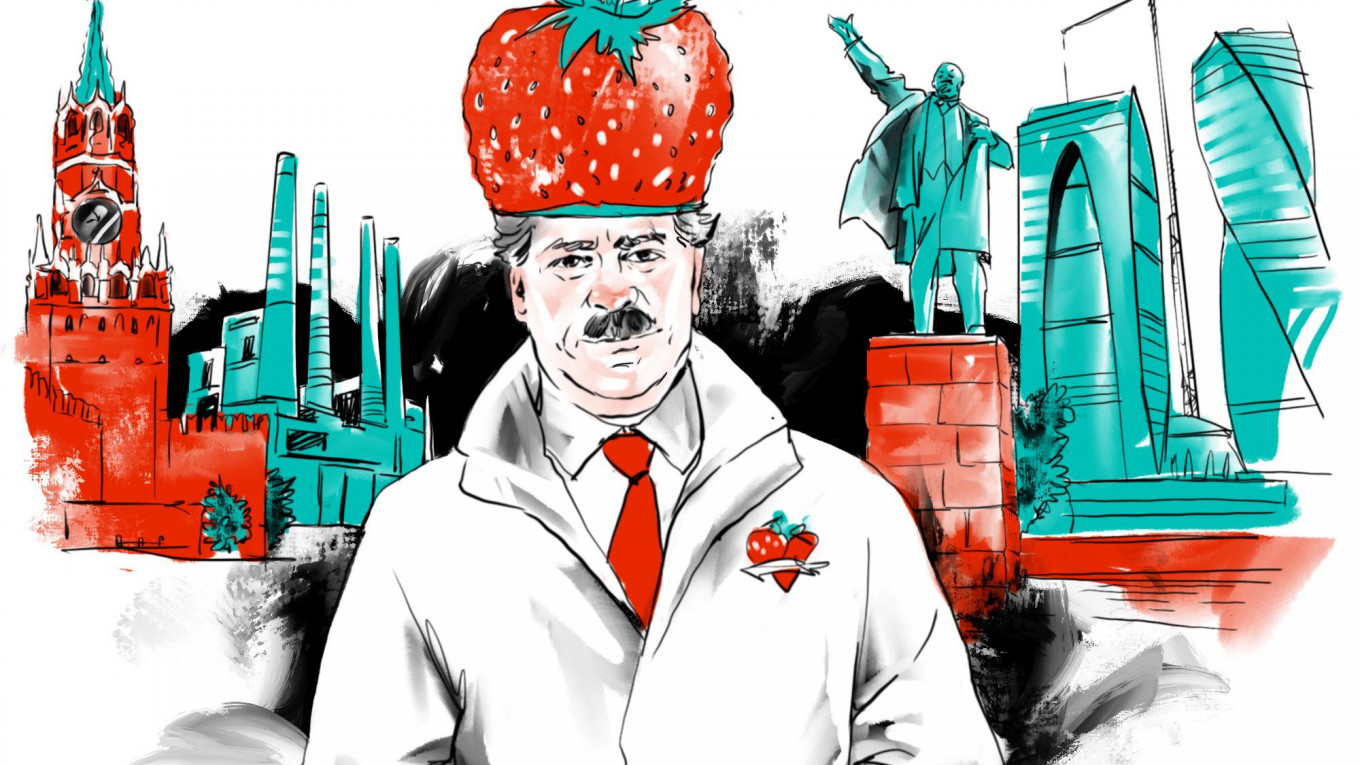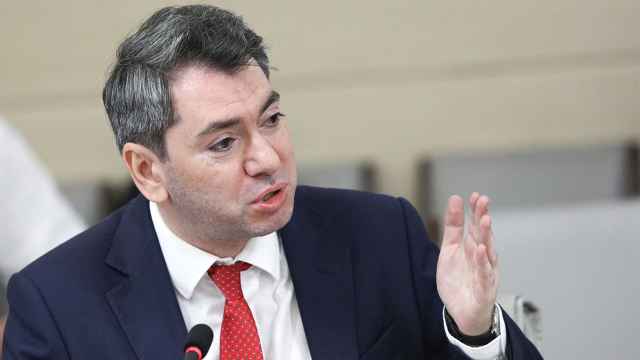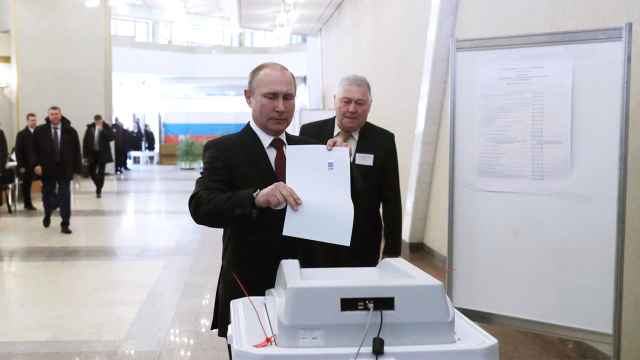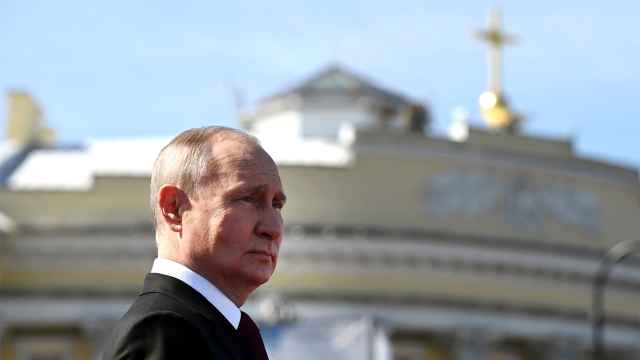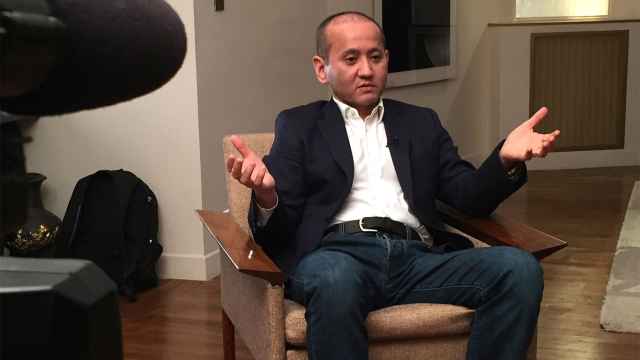Twenty kilometers southeast of the Kremlin and Moscow’s financial district, just beyond the highway that encircles Russia’s capital, stands a relic of the Soviet dream.
On a recent frigid afternoon, residents waited in lines in front of stalls selling fruits and vegetables, playgrounds were packed with parents and their children, and a park was full of strolling residents and visitors. “We never want to leave, even on weekends,” says Irina Nikolaeva, 37, out for a walk with her five-year-old son.
While many former collective farms around the country have stood dilapidated and abandoned since the collapse of the Soviet Union, the Lenin Sovkhoz has flourished. And in a country stumbling out of the longest recession since President Vladimir Putin first became president in 2000, the farm seems plucked from a communist fantasy.
In addition to the farmland that forms the collective's lifeblood, the Sovkhoz is stocked with impressive infrastructure: modern condos, a comprehensive medical clinic — even a school that promises European-style education. Workers here earn 77,000 rubles per year — twice the national average, its administration boasts.
Behind it all is Pavel Grudinin, a convivial 57-year-old with an impressive gut, salt-and-pepper hair and a characteristic mustache.
After 22 years at the helm of the Lenin Sovkhoz, he has provided Russia’s Communist Party with a showroom of what modern socialism could look like. And with his nomination in December, he has also provided the party a candidate for the upcoming presidential elections.
Although there is no doubt that Grudinin will be easily defeated by Vladimir Putin, he has potential for widespread appeal — even beyond his farm’s borders. To some, he offers a taste of a European-style, modern-day socialism. To others, he is a populist who tells it like it is.
“Everyone can see in him what they want to see for themselves,” says political commentator Andrei Pertsev. “They see in him a politician that can answer their hopes.”
Breakout
Hidden away in what he has called a “socialist oasis in the capitalist jungle,” Grudinin was largely unknown until a rare public rant against government corruption two years ago.
“A year ago, the president said, ‘Guys, let’s battle corruption,’” Grudinin told a panel of government officials and economists at the Moscow Economic Forum in 2015. “And in that moment we see people” — here, he makes a motion of a camera panning — “that definitely should be serving time.”
The speech made him an instant celebrity online. In contrast to the bulk of the business community — silent for fear of retribution from the authorities — Grudinin came off as an effective entrepreneur, unafraid to speak his mind.
“I don’t understand,” he told the forum to applause. “If the government can’t do anything, then they need to leave.”
By trade, Grudinin is a farmer. His family moved to the Lenin Sovkhoz, where his father became the chief economist and his mother an accountant, soon after he was born in 1960. Residents recalled Grudinin picking strawberries, the farm’s chief produce, as a teenager.
After graduating from the Moscow State Agroengineering University in 1982, Grudinin returned to the Sovkhoz and quickly rose through its ranks. In 1995, as collective farms across the country were caving under the economic pressures of the turbulent post-Soviet period, he became its director.
In a move that might have saved the Sovkhoz from the fate that befell many others, Grudinin sold a large chunk of land to the mall magnate Aras Agalarov. Since, the Sovkhoz has expanded from a modest farm to a thriving business selling produce to upscale markets. Last year, it earned 4 billion rubles ($7.1 million).
Like many successful businessmen of the ‘90s, Grudinin also entered politics. He was elected to the Moscow regional Duma in 1997 and joined the ruling United Russia party when it came into existence in 2001. Ten years later, though, it forced him out, when it backed another candidate for his seat. After, Grudinin gravitated towards the Communist Party.
A capitalist communist
As the farm’s financial fortunes improved during the new millennium, so did Grudinin’s. According to the Central Election Commission, he has earned an average of 26 million rubles — or around $460,000 — per year over the past six years.
Above all, it is his business acumen that many point to as his key potential for being a successful president, not his political past. “I don’t see him as a politician — that’s a dirty word,” says his friend and entrepreneur Dmitry Potapenko. “I see him as a businessman who can get things done.”
To the Communists, there is no paradox in being represented by a wealthy businessman.
“He is not putting his money in offshore accounts,” party spokesman Alexander Yushenko explained to The Moscow Times. “He is putting it into schools, into medical clinics, into social infrastructure.”
Grudinin, too, argues his record in business serves his candidacy. "I could have been a multi-millionaire many times over," he has said, claiming that, instead, he has put much of his money back into the Sovkhoz.
This, he argues, makes him an attractive candidate in a country where one in ten people struggle to put food on the table. “My main task is to make the Russian people materially well off,” he said in an appearance on Vladimir Solovyov’s TV show on the state-run Rossia-1 last month shortly after his nomination.
Since, Grudinin has criticized what he has called Russia’s “imperial ambitions,” particularly given how pensioners live in poverty at home. He has called for an end to corruption and to the rich exporting their wealth to offshore accounts. Pointing to his “socialist enterprise, ” he has said he wants to turn Russia into an “even better version of China.”
In conversations with those who know him, Grudinin comes across as personable, someone who can attract voters with his character alone. “He was always sociable, a ringleader, the soul of the company — someone who liked enjoying himself,” says Andrei Burykin, a close friend who was a witness at Grudinin’s wedding.
“Every day, by eight in the morning, you can see him walking around, making sure everything is in order,” says Irina Trushkina, a 40-year-old doctor and Sovkhoz resident. “If you are carrying a bag of groceries, he will always run over to offer a helping hand.”
“He is a real man,” she added.
‘Systemic opposition’
Grudinin’s natural charisma is new for the Communist Party, which, since 1993, has been led by the aging, technocratic Gennady Zyuganov. It is also a quality that could help fuel a revival of Communist nostalgia. According to a recent Levada poll, already, 58 percent of Russians regret the Soviet Union’s collapse.
And with an interest in a modern version of socialism trending worldwide, Grudinin perhaps has the potential to lay the groundwork for a new socialism to return to Russia.
Some pundits, however, call into question the very basis of his platform because the Communist Party belongs to Russia’s so-called “systemic opposition,” parties which historically have put up little resistance to the Kremlin’s policies; with the Kremlin desperate to drive voters to the polls to increase overall turnout, Grudinin fits the profile of just the man to help.
“The president did not want Zyuganov campaigning any longer,” says Gleb Pavlovsky, a former Kremlin advisor, because he had become stale to voters. “And since Grudinin is well known to the United Russia party and is trusted by the Communists, the Kremlin was comfortable with him.”
Some have also speculated that the choice of Grudinin could pacify the anger at the exclusion of the opposition politician Alexei Navalny, who has driven youth out in droves in protests across the country, from the election due to a conviction he says is politically motivated. In Grudinin, those who might have voted for Navalny could see an attractive figure.
In any case, the days of Grudinin’s unbridled criticism appear to be over. During a commercial break on the Ekho Moskvy radio station, as a YouTube broadcast continued playing, Grudinin said he would campaign only on the platform agreed upon with the Communist Party. “I’ll say the truth, but not the whole truth,” he told the host.
Ulterior motives?
According to the state-run pollster VTsIOM, 66 percent of voters are prepared to vote for Putin. Coming in second is Grudinin, with just 6 percent.
With the outcome all but predetermined, some pundits have suggested Grudinin’s motives are self-interested and that he is simply campaigning to advertise his business.
Others note his early stumbles: With weeks to go until Election Day, Grudinin was widely reported as having gone skiing in Germany. Revelations of foreign bank accounts have undercut his message.
Sergei Polyakov, a political analyst specializing in the Moscow region, believes Grudinin is actually in the race for an entirely different goal. If Grudinin wins a haul of the presidential election votes, Polyakov says, he will have a good chance of winning the governorship for the Moscow region. That election is in September.
“I just was talking with a Moscow region official,” he says, “and he is already worried Grudinin will now be a big competitor.”
Back at the Sovkhoz, the noise had not registered.
Before parting — her five-year-old was impatient to reach the park — Nikolaeva said she will be voting for Grudinin in the upcoming election, describing him as a man who has proven he can get things done.
Asked if she would like to see more socialist enterprises like Grudinin’s across Russia, she said, “Why not? This place is a gift.”
A Message from The Moscow Times:
Dear readers,
We are facing unprecedented challenges. Russia's Prosecutor General's Office has designated The Moscow Times as an "undesirable" organization, criminalizing our work and putting our staff at risk of prosecution. This follows our earlier unjust labeling as a "foreign agent."
These actions are direct attempts to silence independent journalism in Russia. The authorities claim our work "discredits the decisions of the Russian leadership." We see things differently: we strive to provide accurate, unbiased reporting on Russia.
We, the journalists of The Moscow Times, refuse to be silenced. But to continue our work, we need your help.
Your support, no matter how small, makes a world of difference. If you can, please support us monthly starting from just $2. It's quick to set up, and every contribution makes a significant impact.
By supporting The Moscow Times, you're defending open, independent journalism in the face of repression. Thank you for standing with us.
Remind me later.



